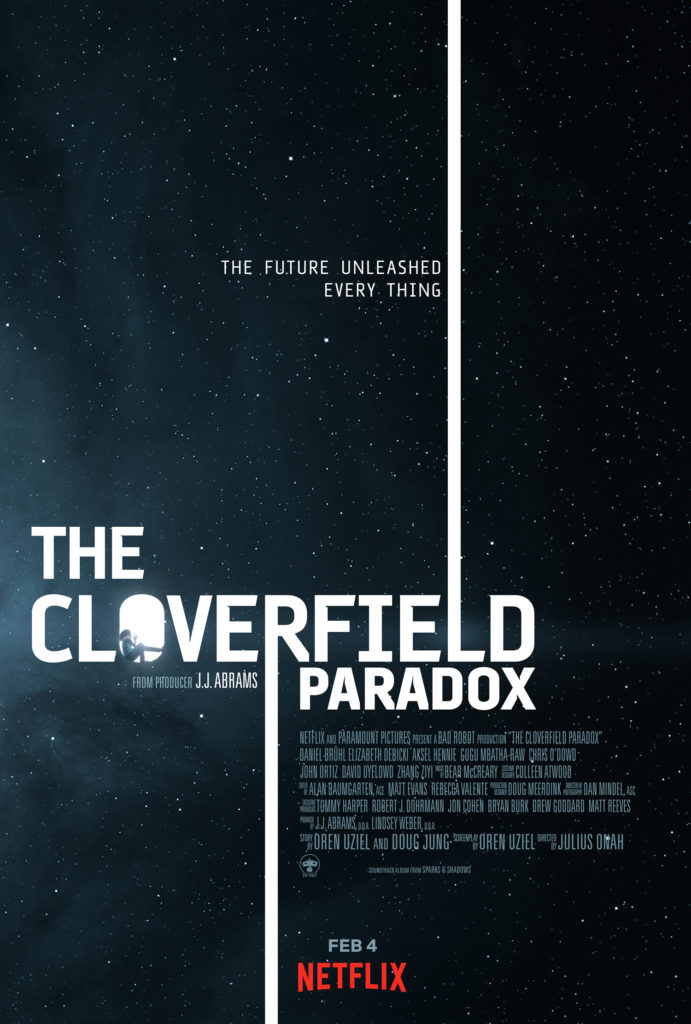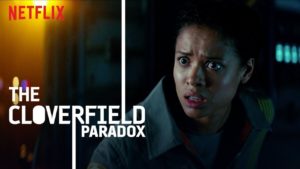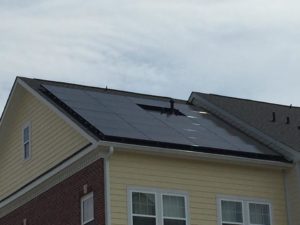Welcome back to Sound Off!, a semi-regular column where members of Speculative Chic gather together to chat about the latest BIG THING in entertainment. This time, make sure nothing in your house has changed color and discuss The Cloverfield Paradox, which premiered on Netflix in the United States on Sunday, February 4, 2018.

Sound Off! is meant to be a reaction, but not necessarily a review. After all, while we are all individuals, even mutual love of something (or hate) can come from different places: you may find everything from critique to fangirling to maybe even hate-watching.
Now, join Shara White and J.L. Gribble as they talk about The Cloverfield Paradox. [Note: Moderate spoilers!]
 Shara: I remember seeing Cloverfield in theaters back in 2008. I liked it well enough, but overall, it was forgettable. Such that when the loosely defined sequel, 10 Cloverfield Lane, came out in 2016, I saw the trailers and thought, “That’s nice,” and forgot all about it. At least until I was on a six-hour flight and 10 Cloverfield Lane was one of the movie selections, and I decided to watch. I loved it: the acting, the claustrophobic setting, the way it tied into the original film, and the score, which was so good that I bought it as soon as I arrived home.
Shara: I remember seeing Cloverfield in theaters back in 2008. I liked it well enough, but overall, it was forgettable. Such that when the loosely defined sequel, 10 Cloverfield Lane, came out in 2016, I saw the trailers and thought, “That’s nice,” and forgot all about it. At least until I was on a six-hour flight and 10 Cloverfield Lane was one of the movie selections, and I decided to watch. I loved it: the acting, the claustrophobic setting, the way it tied into the original film, and the score, which was so good that I bought it as soon as I arrived home.
When I heard there would be a third movie in this universe, taking place in SPAAAACE!!!!!!, I was excited. When I discovered it was premiering immediately after the Super Bowl, my only regret was that I would be spending that time cleaning up from our Super Bowl party instead of watching the film. However, we sat down and watched it the next evening, and after viewing three Cloverfield movies, I can say this particular one was, like the first, enjoyable but forgettable.
Don’t get me wrong: the music caught my ear a few times, and I’ve been a fan of Gugu Mbatha-Raw since I saw her in J.J. Abrams’ one-season wonder Undercovers. It also didn’t escape my notice that the three leads of the film were all people of color, and I really appreciated that (and couldn’t help wonder if that was one of the reasons Paramount was so antsy about this particular installment). Mbatha-Raw’s character, Hamilton, was quietly compelling, and I was invested in her story. I argued with her choices toward the end of the film, and celebrated when she realized those were simply the wrong choices to make. I loved her emotion, her vulnerability. And I loved the (spoiler alert) parallel universe she finds herself in: the differences between the Hamilton we have, and the Hamilton that’s still on Earth in this other universe. Lots of things about the parallel universe fascinated me, and I kept trying to explain things in my head, but even then, I ran into hiccups when trying to make those things make sense.
For example: the energy crisis that drives the creation of the Cloverfield Station is apparently the same in both universes, but the other Hamilton hasn’t yet introduced the battery that took the lives of her children in universe we know? Yet our Hamilton KNOWS the other Hamilton will do so? The timeline doesn’t quite line up.
I also had trouble figuring out what was going on with Mundy’s arm. Played for horror at first, and then comedic affect, I thought perhaps, at first, the arm was being controlled by a parallel universe version of that character, but when it’s all said and done, I really don’t think that’s the case, because the parallel universe’s station crash-landed on Earth (yet still managed to leave a crew member behind in Jensen, and I’m still trying to figure that out).
Maybe the problem is the issue of the paradox itself wasn’t sufficiently explained, and/or I wasn’t playing close enough attention. Some things made sense to me, like why Jensen ended up in the wall or why the worms ended up in Volkov’s insides, but other things didn’t, like why the walls sucked in Mundy’s arm to begin with.
And ultimately, I feel like The Cloverfield Paradox borrowed too heavily from earlier and well-known influences in order to be memorable in its own right: how many times did I think of the chest-bursting scenes from Alien, or the interdimension/hell-hopping of Event Horizon? Too often, this had me predicting what would happen without fear or tension about what was happening on the screen. And it didn’t stop there: the callbacks to the previous Cloverfield movies were distracting in their own ways: the callback to the original movie had me wondering what I’d forgotten, and the callback to 10 Cloverfield Lane had me wondering if the cellar that Michael and the child holed up in was somehow the same cellar of that particular movie, even though I knew, logically, it couldn’t be.
All of that being said: I did enjoy the movie, and I really want Elizabeth Debicki (who played Jensen) in a project with Gwendolyn Christie: they look like they should be sisters! Also, the last shot of The Cloverfield Paradox was pretty memorable in and of itself. I don’t remember getting a good look at the monsters in the first or second movies, but I won’t forget this one, not by a long shot.
J.L.: Though I wasn’t originally planning on watching The Cloverfield Paradox, my husband worked late last Thursday night. So, I declared myself badass enough to watch horror movies by myself at night and binged first 2008’s Cloverfield (which I had never seen before) and then Netflix’s new sequel.
Allow me to digress about Cloverfield for a moment. While there were some tense moments, it wasn’t particularly scary. And since I watch a lot of disaster movies, it was interesting to see a destructive event from the perspective of the “innocent bystanders” rather than the action heroes.
Since that wasn’t so bad, I launched right into The Cloverfield Paradox. Which broke my suspension of disbelief within moments of the introduction.
Take a walk outside with me for a second. Grab a coat — it’s chilly.

See those shiny black things on my roof? Those are called solar panels. They are a form of renewable energy. And you seriously expect me to believe that the near-future world that created that fancy space station is going to war over oil rather than building more solar panels and windmills?
Let’s go back inside. I’ll make tea.
I tried to ignore the renewable energy issue for the rest of the movie, but it was incredibly distracting and made the tension seem fabricated. I’d also argue that this was not a horror movie, but a science-fiction thriller. Like its predecessor, there were some tense moments but nothing particularly nail-biting. It seemed that the writers acquired a list of plot points that must occur in every space station film (someone killed in a malfunctioning airlock, someone dying on a spacewalk, etc.) and felt compelled to write them in. At points, the bad space station science felt comical.
At other points, however, the space station shenanigans were actually pretty cool. Really, any of the issues that occurred due to the dimension hopping were unique and drew my attention (confession: since I was watching this at home instead of in a theater, I may have been playing on my phone a bit, which also says a lot about the quality of the movie). Chris O’Dowd and his arm stole the entire show for me. I’d much rather have seen a movie about intrepid scientists battling a sentient space station, but I’m pretty sure Doctor Who has done that a time or three already.
Another pleasant surprise was that the final conflict occurred between two of the female characters. I also appreciated that the balance of the scientists weighed heavily in favor of people of color, and that our “point of view” character, Gugu Mbatha-Raw’s Hamilton, was allowed to be both an accomplished scientist and a mother without the latter being seen as a weakness.
But even these stand-out moments paled in comparison to the film’s weak ending. I’m sure I should have been shocked, or intrigued, or horrified, or any number of strong emotions. Instead, I said, “Huh,” turned off my TV, and went to bed.
This movie would (rightfully) have flopped in theaters, which is why I imagine Paramount was so happy to sell it off to Netflix. I hope that Netflix does not turn into a dumping ground for studio projects that don’t have good projections. Finishing the last three episodes of Altered Carbon the next evening was a good palate cleanser, and definitely the sort of fare I’ve come to expect from my Netflix subscription.

No Comments